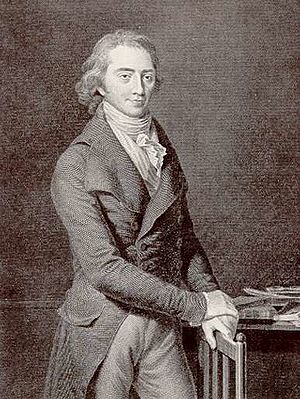Christoph Wilhelm Hufeland facts for kids
Quick facts for kids
Christoph Wilhelm Hufeland
|
|
|---|---|
 |
|
| Born | 12 August 1762 Langensalza
|
| Died | 25 August 1836 |
| Occupation | Physician, naturopath, writer |
Christoph Wilhelm Friedrich Hufeland (born August 12, 1762, in Langensalza – died August 25, 1836, in Berlin) was a famous German physician, a doctor who focused on natural healing, and a writer. He was known as one of the most important doctors of his time in Germany. He wrote many books that showed how much he had read and how well he could think critically.
Contents
Life Story of Hufeland
Hufeland was born in Langensalza, which was then part of Saxony. Today, it is in Thuringia. He grew up in Weimar, where his father was the court physician for the grand duchess. A court physician was a doctor who looked after the health of royal family members.
In 1780, Christoph Hufeland started studying at the University of Jena. The next year, he moved to the University of Göttingen. In 1783, he finished his studies and became a doctor of medicine.
Becoming a Professor
After helping his father in Weimar for a few years, Hufeland was asked to become a professor of medicine at Jena in 1793. At the same time, he also became the court physician and a professor of pathology in Weimar. Pathology is the study of diseases.
In 1798, Frederick William III of Prussia, who was the king, gave him an important job. Hufeland became the director of the medical college at the Charité hospital in Berlin. He was also in charge of medical affairs for the state.
Later, in 1809, he became a professor of pathology and how to treat illnesses at the Humboldt University of Berlin. In 1810, he was made a state councillor, which was a high government position. In 1823, he was chosen to be a member of the Royal Swedish Academy of Sciences.
Over time, Hufeland became as well-known in his home country as famous writers like Goethe and Schiller. He was also a close friend of Samuel Hahnemann, who founded homeopathy. Hufeland even published Hahnemann's first writings in his own medical journal in 1796.
His Important Writings
One of Hufeland's most famous books was called Makrobiotik oder Die Kunst, das menschliche Leben zu verlängern. This means "Macrobiotics or The Art of Prolonging Human Life." He wrote it in 1796, and it was translated into many languages.
He also wrote a big book about practical medicine called System der praktischen Heilkunde (System of Practical Medicine) between 1818 and 1828. From 1795 to 1835, he published a medical journal called Journal der praktischen Arznei und Wundarzneikunde. His own life story, an autobiography, was published after he died in 1863.
Hufeland and Natural Healing
Hufeland was one of the first people to support naturopathic medicine. This is a type of medicine that focuses on natural ways to heal the body. He believed in a "life force" that helps us stay healthy. He thought that we could keep this life force strong through good habits and what we eat.
Hufeland was inspired by Hippocrates, an ancient Greek physician. He promoted what he called "natural therapeutics" (naturtherapeutik). He also supported the use of homeopathy, which is a system of medicine based on the idea that "like cures like."
The Idea of Macrobiotics
The word "macrobiotics" was used by Hufeland in his book Macrobiotics: The Art of Prolonging Life. This book was translated into English in 1797. It suggested a plan for good health and for living a longer life. Hufeland often recommended a vegetarian diet, meaning eating no meat.
Goethe and his wife were very interested in Hufeland's book. In Germany, people who followed Hufeland's ideas about diet and health were part of the "Hufelandist movement." Later, George Ohsawa, who started the modern macrobiotic diet, was influenced by Hufeland's ideas.
Family Life
Christoph Hufeland was married twice. His first wife was Juliane Amelung (1771–1845). His second wife was Elisabeth Helene Troschel (1777–1862).
From his first marriage, he had three daughters:
- Elwira Laura (born in 1799), who married Karl Wilhelm von Becherer.
- Rosalia (born in 1801), who married her cousin August Wilhelm Adolph Hufeland.
- Elisabeth, who married Prince Alexandru Sturdza. Through their son, Prince Nicolae Sturdza, Christoph Wilhelm Hufeland is the great-great-grandfather of Queen Natalie of Serbia and the great-great-great-grandfather of King Alexander I of Serbia.
Images for kids
See also
 In Spanish: Christoph Wilhelm Hufeland para niños
In Spanish: Christoph Wilhelm Hufeland para niños
 | Toni Morrison |
 | Barack Obama |
 | Martin Luther King Jr. |
 | Ralph Bunche |


